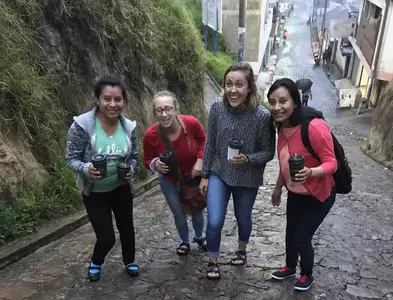
Claire Jacob Guatemala Journal: A History Lesson
Aug 10, 2017 | Women's Swimming and Diving
Tulane diver Claire Jacob is currently on a mission trip in Patzún, Guatemala. She will provide updates and photograph her journey during the two-week trip, sharing her experiences along way.
DAYS 9 AND 10 - August 9-10, 2017
Entry by Claire Jacob
Aug. 9
DAYS 9 AND 10 - August 9-10, 2017
Entry by Claire Jacob
Aug. 9
This past week has been a whirlwind of events. On Monday, I accompanied Anise, Franny, and Shelby to the airport in Guatemala City because they were to leave on Monday and my co-founder, Maria DeRenzo, was flying into Guatemala that afternoon so that we could spend my second week here having meetings and observing the Voices for Patzún program. Anise, Franny, and Shelby made it to the airport safely, but Maria's first plane was delayed and she missed her connection. The only other flight that day would arrive at 8 p.m., and the trek from Guatemala City to Patzún is too dangerous to drive at night so Maria had to change her flight to Tuesday instead. Although Maria didn't arrive on Monday, there were two other Franciscan Sisters that were to arrive at 2:10 p.m. Unfortunately, their flight was delayed by three hours, so I spent the entire day waiting with Hermana Ana Miriam and the orphanage's driver.
The three of us went to visit a community of sisters in Guatemala City for about an hour. While Hermana Ana Miriam met with the other sisters, I was left alone with our driver, Erik, who is an incredibly kind and resilient individual. While it was difficult, I managed to hold a conversation with him in Spanish and he poured out his life to me, sharing with me his past struggles, stories about his family, words of advice, and his testimony regarding his faith in God the Father. It's incredible the conversations you get to have with people who you hardly know if only you open yourself up to the opportunity to be vulnerable and authentic with others.

We then went to a fast-food restaurant for chicken and headed back to the airport to pick up the two sisters from their flight. However, they didn't land until 5:30 p.m., so Hermana Ana Miriam and I stood at the doors to the airport during a thunderstorm for three hours until the Sisters finally arrived! We spent the rest of the night driving around Guatemala City (in traffic) to deliver documents from to various universities.
I ended up falling asleep in the car and when I felt that we had parked, I opened my eyes to find that we were in a Domino's parking lot where we ended up having dinner. We didn't return to the Hogar (orphanage) until 10:30 at night!
Yesterday, I went back to the airport with a different sister to pick up Maria and we spent the rest of the day running errands (picking up eggs, lightbulbs, placemats) in the city and having lunch with Hermana and Erik. On the way home we all sang ABBA in the car for a bit and prayed a rosary. By the end of the day, the four of us had accumulated multiple inside jokes and Maria and I overheard Hermana telling some of the girls at the Hogar about all of the "fun things" that she did with us that day.
Aug. 10
Today, Maria and I met with one of the administrators at the school (Hermana Leticia) to discuss the Special Needs Equal Education program.
The program was originally held 2 days per week with tutoring for children with Special Needs in grades 1-3. In the last two months however, the program has expanded to grades 4-6 also as requested by the students, teachers, administrators, and parents at the school. Now, the program is held every day after school and contains 108 children and five consistent teachers. Additionally, the children in grades 1-3 come to the school on Saturdays for a few hours to receive specific test prep for four sessions that run every other week before they have their cumulative exams.

We also discussed the prospect of providing lunch for students who are in the program and are from aldeas in the surrounding terrain. Aldeas are very small, rural villages (often containing around 40 people) that are nestled in Guatemala's mountainsides. The people in these villages live in extreme poverty and have suffered class and racial oppression for a number of years.
A quick history lesson:
There was a devastating civil war between the Guatemalan government and the native Maya-Guatemalan population (almost all lower class due to the resounding and inherited effects of colonialism and conquests in the 15th-18th centuries. During the Cold War in the 1960's, the United States was not only struggling against the spread of Communism in Europe and Asia, but was also trying to control potential communist governments in Latin America. Because communism supported a more equal distribution of wealth amongst citizens, the native Guatemalans who were (and still are) suffering from the oppression of racial privilege and the corresponding lack of it, moved to adopt communism and tried to overthrow their unjust government.
When the United States became aware of the communist uprising, the CIA appealed to Congress, asking permission to step in militarily in support of the Guatemalan Government. Congress would not allow the CIA to send troops to Guatemala and so instead, without consent from Congress, the CIA provided the Guatemalan Government with weaponry. This act facilitated what was essentially a genocide on the native Guatemalan peoples, particularly those living in aldeas because they had no way of resisting the attacks.
Last year, I spent a few hours talking with a man who works at the Hogar. He's around 40 years old at this point and lived through some of the horrors of the war. When he was 16, he was attending school at San Bernadino in Patzún but lived in an aldea of 36 people. He trekked to and from school every day for about an hour each way. One day while he was at school, the government militia laid siege to his aldea. When he returned from school, he could see the military in the village and so he hid in the surrounding jungle with a woman who is now his wife for the rest of the night until all was quiet in the morning. When he searched the village, he found that only about 10 people had survived the attack (he and his wife included) and those who had passed were tortured and then locked in the aldea's church which was promptly set on fire the night before.
I was surprised that he had shared his story with me because when reading about the war before this instance, I found that many researchers admitted that most people would not discuss the attacks out of A. fear and B. trauma. However, I have learned that if you ask about their faith and why these individuals place so much trust in God, they happily share their testimony with you; their faith stories contain suffering (often tied to the war in which Catholics were persecuted because it was and still is the religion of the common people) AND an erotic*, indescribable joy in the midst of it.
While violent oppression no longer exists in Guatemala and the Civil War ceased in the 1990's, there is still certainly class oppression and social immobility, especially amongst the aldea populations. For this reason, most of the children from the aldeas who now attend San Bernadino on scholarship are living in dire poverty. The administration at the school has recognized a need for lunches to be provided to the children from aldeas who cannot bring lunch with them and live too far away to go home for lunch in between school and our tutoring program.
---
After meeting with Hermana Leticia, Maria and I visited a woman named Paola who housed us for a few weeks last year and she invited us over for dinner with her extended family tomorrow night. She asked us how our families were, what we've been doing with our summer, how we are doing in school, and if we have boyfriends now. While talking about significant others, Paola asked if my dad liked mine and I said that I don't think dads ever necessarily "like" when their daughters are dating someone. And Paola said "Si, padres son muy celosos por sus hijas" which, directly translated, means "yes, fathers are always jealous for their daughters." She then went on to tell us about how her father never liked when she dated people and that he would be happy that she isn't married. She talked about how some of her friends are married but are not happy and some are even abused.
Paola pointed out that there is still a "machismo" attitude in Latin America. But before closing the topic, she also commented on the fact that often in America, women are psychologically abused without even knowing it - that women are pulled into situations in which they place their identity in their significant other and aren't respected the way that women deserve. We are subliminally treated in a way that does not honor our worth and beauty and individuality. And we can't even tell that we are burdened with psychological wounds because they aren't bruises that we can see and feel and prove to ourselves and others, but they are still there and are often even more dangerous than those that are visible because they lie silently in a warm, dark portion of our psyche where we allow them to fester.
Women: I implore you to recognize that each of you were individually and irreplicably created with an immeasurable worth and dignity. Do not allow beauty ads, family expectations, and masculine exploitation of the feminine genius to distort the fact that you were created for love by Love itself. Exercise authentic feminism then in the way that you love others, support your sisters, bring the beauty that YOU ARE to this world and discover your own passions and desires in the process. Recognize wounds caused by others and forgive them (the wounds) because we must understand where and why we are hurting before we can heal. Then, forgive those who caused them because you are bigger than your wounds and you are above and beyond strong enough to love even those who inflicted them. Be vulnerable with others and understand that you are not in this cultural battle alone.
Again, it's incredible the conversations you can find yourself a part of if you only allow yourself to be vulnerable with another person.
One of the most important parts of being on mission is simply being there for and listening to others. If a missionary is not receptive, he/she can often create more harm than good which is why most of our work is simply learning about the community in which we work, creating plans with its members, providing the funds, and allowing the community to sustainably take the reigns. And in the process, as exemplified by our conversation with Paola today, the missionary grows to know him/herself better than the day before.
The three of us went to visit a community of sisters in Guatemala City for about an hour. While Hermana Ana Miriam met with the other sisters, I was left alone with our driver, Erik, who is an incredibly kind and resilient individual. While it was difficult, I managed to hold a conversation with him in Spanish and he poured out his life to me, sharing with me his past struggles, stories about his family, words of advice, and his testimony regarding his faith in God the Father. It's incredible the conversations you get to have with people who you hardly know if only you open yourself up to the opportunity to be vulnerable and authentic with others.

We then went to a fast-food restaurant for chicken and headed back to the airport to pick up the two sisters from their flight. However, they didn't land until 5:30 p.m., so Hermana Ana Miriam and I stood at the doors to the airport during a thunderstorm for three hours until the Sisters finally arrived! We spent the rest of the night driving around Guatemala City (in traffic) to deliver documents from to various universities.
I ended up falling asleep in the car and when I felt that we had parked, I opened my eyes to find that we were in a Domino's parking lot where we ended up having dinner. We didn't return to the Hogar (orphanage) until 10:30 at night!
Yesterday, I went back to the airport with a different sister to pick up Maria and we spent the rest of the day running errands (picking up eggs, lightbulbs, placemats) in the city and having lunch with Hermana and Erik. On the way home we all sang ABBA in the car for a bit and prayed a rosary. By the end of the day, the four of us had accumulated multiple inside jokes and Maria and I overheard Hermana telling some of the girls at the Hogar about all of the "fun things" that she did with us that day.
Aug. 10
Today, Maria and I met with one of the administrators at the school (Hermana Leticia) to discuss the Special Needs Equal Education program.
The program was originally held 2 days per week with tutoring for children with Special Needs in grades 1-3. In the last two months however, the program has expanded to grades 4-6 also as requested by the students, teachers, administrators, and parents at the school. Now, the program is held every day after school and contains 108 children and five consistent teachers. Additionally, the children in grades 1-3 come to the school on Saturdays for a few hours to receive specific test prep for four sessions that run every other week before they have their cumulative exams.

We also discussed the prospect of providing lunch for students who are in the program and are from aldeas in the surrounding terrain. Aldeas are very small, rural villages (often containing around 40 people) that are nestled in Guatemala's mountainsides. The people in these villages live in extreme poverty and have suffered class and racial oppression for a number of years.
A quick history lesson:
There was a devastating civil war between the Guatemalan government and the native Maya-Guatemalan population (almost all lower class due to the resounding and inherited effects of colonialism and conquests in the 15th-18th centuries. During the Cold War in the 1960's, the United States was not only struggling against the spread of Communism in Europe and Asia, but was also trying to control potential communist governments in Latin America. Because communism supported a more equal distribution of wealth amongst citizens, the native Guatemalans who were (and still are) suffering from the oppression of racial privilege and the corresponding lack of it, moved to adopt communism and tried to overthrow their unjust government.
When the United States became aware of the communist uprising, the CIA appealed to Congress, asking permission to step in militarily in support of the Guatemalan Government. Congress would not allow the CIA to send troops to Guatemala and so instead, without consent from Congress, the CIA provided the Guatemalan Government with weaponry. This act facilitated what was essentially a genocide on the native Guatemalan peoples, particularly those living in aldeas because they had no way of resisting the attacks.
Last year, I spent a few hours talking with a man who works at the Hogar. He's around 40 years old at this point and lived through some of the horrors of the war. When he was 16, he was attending school at San Bernadino in Patzún but lived in an aldea of 36 people. He trekked to and from school every day for about an hour each way. One day while he was at school, the government militia laid siege to his aldea. When he returned from school, he could see the military in the village and so he hid in the surrounding jungle with a woman who is now his wife for the rest of the night until all was quiet in the morning. When he searched the village, he found that only about 10 people had survived the attack (he and his wife included) and those who had passed were tortured and then locked in the aldea's church which was promptly set on fire the night before.
I was surprised that he had shared his story with me because when reading about the war before this instance, I found that many researchers admitted that most people would not discuss the attacks out of A. fear and B. trauma. However, I have learned that if you ask about their faith and why these individuals place so much trust in God, they happily share their testimony with you; their faith stories contain suffering (often tied to the war in which Catholics were persecuted because it was and still is the religion of the common people) AND an erotic*, indescribable joy in the midst of it.
While violent oppression no longer exists in Guatemala and the Civil War ceased in the 1990's, there is still certainly class oppression and social immobility, especially amongst the aldea populations. For this reason, most of the children from the aldeas who now attend San Bernadino on scholarship are living in dire poverty. The administration at the school has recognized a need for lunches to be provided to the children from aldeas who cannot bring lunch with them and live too far away to go home for lunch in between school and our tutoring program.
---
After meeting with Hermana Leticia, Maria and I visited a woman named Paola who housed us for a few weeks last year and she invited us over for dinner with her extended family tomorrow night. She asked us how our families were, what we've been doing with our summer, how we are doing in school, and if we have boyfriends now. While talking about significant others, Paola asked if my dad liked mine and I said that I don't think dads ever necessarily "like" when their daughters are dating someone. And Paola said "Si, padres son muy celosos por sus hijas" which, directly translated, means "yes, fathers are always jealous for their daughters." She then went on to tell us about how her father never liked when she dated people and that he would be happy that she isn't married. She talked about how some of her friends are married but are not happy and some are even abused.
Paola pointed out that there is still a "machismo" attitude in Latin America. But before closing the topic, she also commented on the fact that often in America, women are psychologically abused without even knowing it - that women are pulled into situations in which they place their identity in their significant other and aren't respected the way that women deserve. We are subliminally treated in a way that does not honor our worth and beauty and individuality. And we can't even tell that we are burdened with psychological wounds because they aren't bruises that we can see and feel and prove to ourselves and others, but they are still there and are often even more dangerous than those that are visible because they lie silently in a warm, dark portion of our psyche where we allow them to fester.
Women: I implore you to recognize that each of you were individually and irreplicably created with an immeasurable worth and dignity. Do not allow beauty ads, family expectations, and masculine exploitation of the feminine genius to distort the fact that you were created for love by Love itself. Exercise authentic feminism then in the way that you love others, support your sisters, bring the beauty that YOU ARE to this world and discover your own passions and desires in the process. Recognize wounds caused by others and forgive them (the wounds) because we must understand where and why we are hurting before we can heal. Then, forgive those who caused them because you are bigger than your wounds and you are above and beyond strong enough to love even those who inflicted them. Be vulnerable with others and understand that you are not in this cultural battle alone.
Again, it's incredible the conversations you can find yourself a part of if you only allow yourself to be vulnerable with another person.
One of the most important parts of being on mission is simply being there for and listening to others. If a missionary is not receptive, he/she can often create more harm than good which is why most of our work is simply learning about the community in which we work, creating plans with its members, providing the funds, and allowing the community to sustainably take the reigns. And in the process, as exemplified by our conversation with Paola today, the missionary grows to know him/herself better than the day before.
Players Mentioned
Tulane Swimming vs West Florida
Friday, January 29
Swimming & Diving Records Four First-Place Finishes at LSU
Tuesday, December 15
SMU vs Tulane
Saturday, January 25
Wave Talk #5 with Leah Stancil
Friday, December 27














